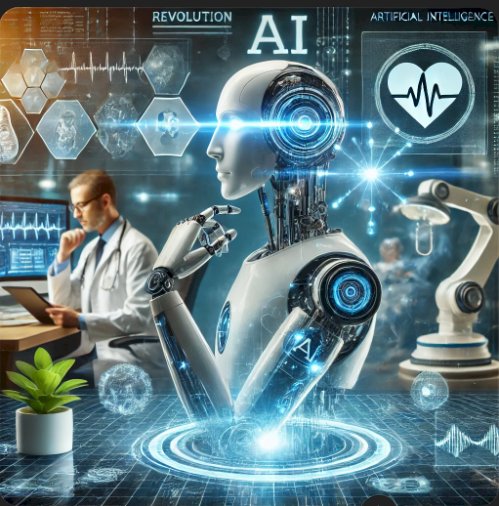How AI is Revolutionizing Healthcare: Transforming the Future of Medicine
Discover how AI is revolutionizing the healthcare industry by enhancing diagnostics, personalizing treatments, streamlining tasks, and accelerating drug discovery. Learn why AI is the future of medicine.

Artificial Intelligence (AI) is no longer a futuristic concept confined to science fiction. It is a transformative technology that is reshaping industries worldwide, and healthcare is no exception. From enhancing diagnostics to personalizing treatment plans, AI is proving to be a game-changer, offering innovative solutions to some of the most pressing challenges in medicine.
In this blog, we’ll explore the profound ways AI is revolutionizing healthcare and why it holds the key to a healthier tomorrow.
1. Enhancing Disease Diagnosis
One of the most significant contributions of AI in healthcare is its ability to analyze vast amounts of medical data with unmatched speed and accuracy. AI-powered tools like machine learning algorithms and natural language processing are being used to:
- Detect Diseases Early: AI can identify subtle patterns in medical images, such as X-rays, CT scans, and MRIs, enabling earlier and more accurate detection of conditions like cancer, cardiovascular diseases, and neurological disorders.
- Reduce Diagnostic Errors: By cross-referencing millions of patient cases and medical literature, AI systems minimize human errors in diagnostics, improving patient outcomes.
Case in Point
Google's DeepMind has developed an AI algorithm that detects over 50 types of eye diseases from retina scans, achieving accuracy comparable to top ophthalmologists.
2. Personalized Medicine: The Era of Tailored Treatment
Gone are the days of one-size-fits-all treatments. AI is paving the way for precision medicine, where therapies are customized based on individual patient data, such as:
- Genomic Information: AI analyzes genetic profiles to determine which treatments are most likely to succeed for a particular patient.
- Lifestyle and Environment: Machine learning models incorporate lifestyle factors and environmental conditions to recommend optimal health interventions.
Why It Matters
Personalized medicine not only improves the effectiveness of treatments but also reduces adverse reactions, saving lives and cutting healthcare costs.
3. Streamlining Administrative Tasks
Healthcare professionals often spend a significant portion of their time on administrative work, which detracts from patient care. AI automates these tasks, such as:
- Scheduling Appointments: AI chatbots can efficiently manage patient appointments and send reminders.
- Medical Documentation: Speech-to-text AI tools help doctors document patient visits faster and more accurately.
- Claims Processing: AI systems expedite insurance claims by identifying errors and fraud.
Result
By automating mundane tasks, AI allows healthcare providers to focus on what truly matters: patient care.
4. Revolutionizing Drug Discovery
The traditional drug discovery process is time-consuming and costly, often taking years and billions of dollars. AI accelerates this process by:
- Identifying Potential Drug Candidates: AI algorithms analyze biological data to predict how drugs will interact with the human body.
- Simulating Clinical Trials: AI creates virtual models to test drug efficacy, reducing the need for extensive human trials.
Real-World Example
During the COVID-19 pandemic, AI played a crucial role in identifying molecules that could combat the virus, speeding up vaccine development.
5. Remote Patient Monitoring and Telemedicine
AI-driven devices and applications are making healthcare more accessible by enabling:
- Real-Time Monitoring: Wearables equipped with AI can track vital signs, such as heart rate, blood pressure, and glucose levels, alerting doctors to potential issues in real-time.
- Virtual Consultations: AI-powered telemedicine platforms facilitate remote consultations, breaking down geographical barriers to healthcare access.
Impact on Healthcare
These advancements are especially beneficial in rural and underserved areas, ensuring timely medical attention and reducing hospital readmissions.
6. Predictive Analytics for Preventative Care
AI excels at analyzing historical and real-time data to predict potential health risks, enabling preventative care. For instance:
- Chronic Disease Management: AI identifies patients at risk for chronic illnesses like diabetes and hypertension, suggesting early interventions.
- Outbreak Prediction: AI models can forecast disease outbreaks by analyzing patterns in environmental, travel, and social media data.
Looking Ahead
With predictive analytics, healthcare systems can shift from reactive to proactive care, improving overall population health.
Challenges and Ethical Considerations
While the potential of AI in healthcare is immense, it is not without challenges:
- Data Privacy: Protecting sensitive patient information is critical.
- Bias in Algorithms: Ensuring AI systems are free from bias to avoid disparities in healthcare delivery.
- Regulatory Hurdles: Establishing guidelines for the safe and ethical use of AI technologies.
By addressing these issues, we can harness AI’s full potential while safeguarding patient trust.
Conclusion: A Healthier Future with AI
AI is undeniably revolutionizing the healthcare industry, transforming how we diagnose, treat, and manage diseases. As AI technologies continue to evolve, they promise a future where healthcare is more efficient, personalized, and accessible.
The road ahead is filled with possibilities, and embracing AI is not just an option but a necessity for a healthier, smarter world.
Let’s reimagine healthcare together with AI—where innovation meets compassion to save lives.

 Ashish Kumar
Ashish Kumar 













